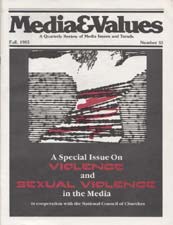Networks Voice Views On Violence Research
|
This article originally appeared in Issue# 33
|
Among media insiders, the continuing debate on television and violence has focused most recently on a 1982 report from the National Institute of Mental Health (NIMH) entitled Television and Behavior. Among its findings was the controversial conclusion that a causal relationship does exist between television violence and aggressive behavior.
In testimony before the NCCC Commission David Pearl, Ph.D., Chief of Behavioral Science, Department of Health and Human Services, NIMH, reported: "The unanimous consensus was that there is a general learning effect from television viewing which is important in the development and functioning of many viewers, particularly children." He explained further that "probably no single factor exclusively by itself makes a person seriously aggressive or antisocial...But with other conditions, it [television] may play a significant role in shaping behavioral style, when and how violence, aggressiveness or other antisocial behavior gets expressed." Industry reaction to the NIMH report was critical, questioning the validity of the studies reviewed as well as the overall conclusions. Here are three responses:
- "Now as to the 1982 National Institute of Mental Health Report, which was titled Television and Behavior, there's some understandable confusion about it. It was highly publicized as comprehensive, but it was in fact very narrowly based. It failed to distinguish between correlation and causation. And while it concluded that viewing television violence causes aggressiveness, it did not find a single study which confirmed that television violence causes behavior that could be characterized as violent in any socially significant way".
– Gene Jankowski, President, CBS/Broadcast Group
-
"Our analysis of the research which the NIMH has used to substantiate their conclusions regarding television and violence indicates that there are more unanswered questions than there are definitively settled issues." - From A Research Perspective on Television and Violence, prepared by ABC's Social Research Unit
- "All the previous attempts to investigate the role of television have nor provided clear answers implicating that medium as a cause of anti-social behavior. Although there are many who believe that television is guilty as charged, a more recent view beginning to develop among researchers in the field is that the evidence is not strong enough to conclude that television influences real-life anti-social behavior." – J. Ronald Milavsky, Director of Social Research / NBC
The question of television's influence on viewer behavior is admittedly a complex one and may never be fully resolved. Perhaps psychologist Howard Gardner has the final insight: "Society has twisted researchers' arms to address questions for which there never could be hard answers.... Probably the chief stumbling block to reaching any definitive conclusions is that almost everyone has a television set.... The crucial controlled experiment – comparing individuals who have television with those who do not – cannot be done."



